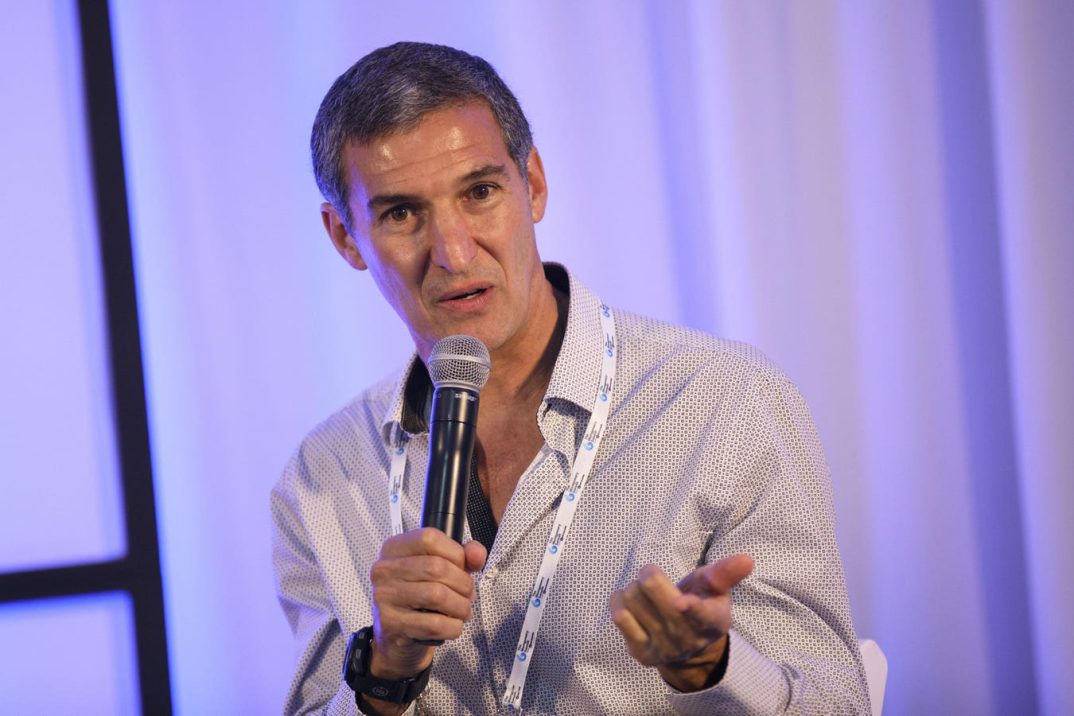Seth Goldman, chairman of the board of Beyond Meat and co-founder of Honest Tea, speaks during The … [+]
© 2017 Bloomberg Finance LP
Personal branding has become a hot topic for business professionals, with Harvard Business Review even covering the topic.
Building a strong personal brand can open new opportunities for growth – whether that be for your own status in the industry you work or for the growth of your firm. Regardless of your motive, a key enabler to increasing your personal brand is to gain visibility and influence – and an excellent way to do that is by speaking at industry events to show your expertise.
A good example is Seth Goldman – Co-Founder of Eat the Change, PLNT Burger, & Honest Tea and Chair of the Board of Beyond Meat. In November 2013, Goldman gave a TEDx MidAtlantic talk about how entrepreneurs can change society by sharing the origin story of Honest Tea. Today, Goldman is paid to deliver keynote speeches around the world and has been lauded with the Visionary CEO award (Partnership for a Healthier America) and Entrepreneur of the Year (Ernst & Young).
I sat down with a panel of three experts in the speaking industry and asked them to share tips for how business professionals can increase their personal brand through speaking.
Build Relationships With Industry Associations
When you think about speaking as a way to build your personal brand, TedTalks may come to mind. However, all of the experts I talked to recommended building relationships with industry trade events and professional associations as one of the best ways for leaders to use speaking as a platform.
Brittanny Kreutzer, a partner at The Speaker Exchange Agency, shares that trade and professional associations “are an excellent place to start to build your personal brand because they are always seeking to fill educational sessions.”
Richard Schelp – owner and managing partner of Executive Speaker Bureau – agrees and adds that he is seeing an increase in requests for speakers who have not just done great things but are in the middle of doing great things. “People are struggling with how to solve practical business problems such as sustainability and supply chain challenges. Event planners want to tap into leaders who are willing to share their knowledge about how they are tackling these problems.”
The panel of experts suggests that volunteering to fill the educational sessions at trade conferences is an excellent way to start building a reputation as an expert.
While you won’t likely get paid to speak at these events, you are getting your name out and starting to build a brand for yourself. The logic? The more you speak, the more you will get asked to speak if you are good. “I’ve seen many professional speakers who built their reputation by sharing their expertise at trade industry and professional association conferences which helped them create a strong personal brand,” shared Michelle Joyce, Founder and President of Michelle Joyce Speakers, one of the top speaker management agencies in the U.S.
Be Ready When Asked
While many conference events have a call for speakers to fill the speaking opportunities for educational sessions, Joyce shared it is not uncommon for event planners to want to tap into people they know are good speakers.
For this reason, all of the experts I talked to stressed you need to be ready when asked to speak. They defined readiness as having both excellent content and speaking skills.
Excellent content means having a polished presentation. This means not just having great-looking PowerPoint slides but also having a cohesive message that gets your message across and has a positive impact on your audience.
But good content is only half of the equation. “Face it, we’ve all been to an event and heard a speaker who had a really great message but was a terrible speaker. The more practice you get, the better you will be,” said Joyce. She recommends “getting your reps in” and finding low-risk speaking opportunities where you can practice and hone your skills.
Schelp suggests joining your local Toastmasters club or hiring a professional speaking coach. “While people early in their careers may not be able to afford a speaking coach, they can join their local Toastmasters club. However, if you are a higher-level executive or entrepreneur who represents their company it makes a lot of sense to invest in a professional speaking coach who can help you hone your presentation skills.”
Be Proactive In Building Your Brand
For those wanting to build their personal brand through speaking, Schelp recommends finding ways to advertise your expertise. For example, highlighting speaking on your LinkedIn profile or investing in a personal website that showcases your expertise as a speaker.
A good example is April Hansen who is the Group Vice President for Workforce Solutions at Aya Healthcare –the largest provider of healthcare staffing software and services.
For entrepreneurs who own their own company, setting up a personal website may be easy because they are their own boss. However, if you are working at a company – especially a large company – this may be frowned upon. Schelp advises checking with your company to make sure they are supportive of your goals. “If you are speaking on a topic about what your company is doing, they will likely be supportive as long as you’re not saying anything that’s against what your corporation is all about.”
The End Game
Even if you have no desire to become a professional speaker, speaking can be a powerful way to leave a lasting impression and impact on the next generation of leaders. For this reason, Joyce’s number one tip is to know what you want to be known for. “Ask yourself what you want your legacy to be. When someone thinks of your name in a leadership position, what’s the first thing that you want to come to mind? “




